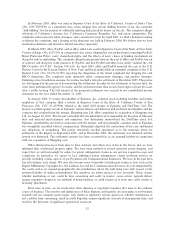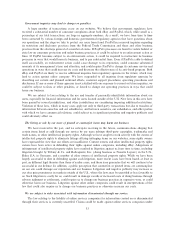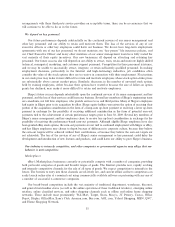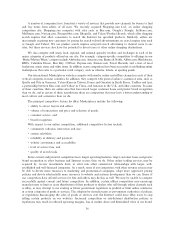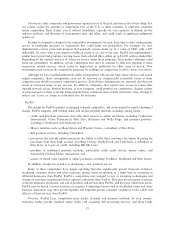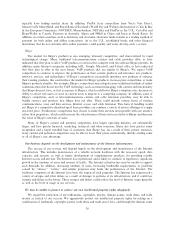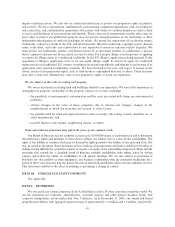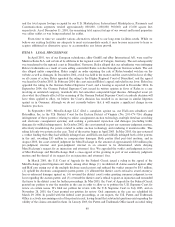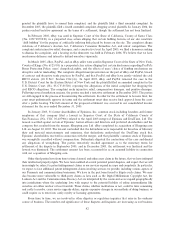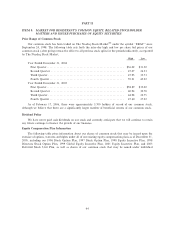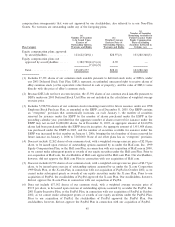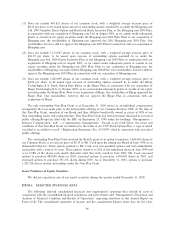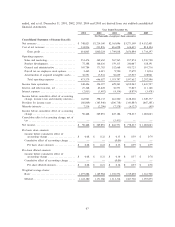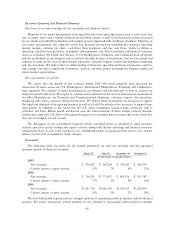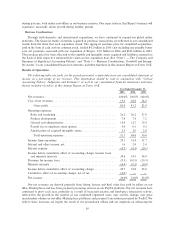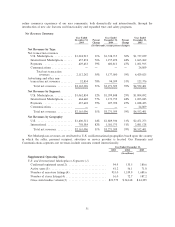eBay 2005 Annual Report Download - page 46
Download and view the complete annual report
Please find page 46 of the 2005 eBay annual report below. You can navigate through the pages in the report by either clicking on the pages listed below, or by using the keyword search tool below to find specific information within the annual report.granted the plaintiffs leave to amend their complaint, and the plaintiffs filed a third amended complaint. In
December 2005, the plaintiffs filed a fourth amended complaint, dropping several plaintiffs. In January 2006, the
parties reached tentative agreement on the terms of a settlement, though the settlement has not been finalized.
In February 2005, eBay was sued in Superior Court of the State of California, County of Santa Clara
(No. 105CV035930) in a purported class action alleging that certain bidding features of our site constitute
""shill bidding'' for the purpose of artificially inflating bids placed by buyers on the site. The complaint alleges
violations of California's Auction Act, California's Consumer Remedies Act, and unfair competition. The
complaint seeks injunctive relief, damages, and a constructive trust. In April 2005, we filed a demurrer seeking
to dismiss the complaint, and a hearing on the demurrer was held in February 2006. We believe that we have
meritorious defenses and intend to defend ourselves vigorously.
In March 2005, eBay, PayPal, and an eBay seller were sued in Supreme Court of the State of New York,
County of Kings (No. 6125/05) in a purported class action alleging that certain disclosures regarding PayPal's
Buyer Protection Policy, users' chargeback rights, and the effects of users' choice of funding mechanism are
deceptive and/or misleading. The complaint alleged misrepresentation on the part of eBay and PayPal, breach
of contract and deceptive trade practices by PayPal, and that PayPal and eBay have jointly violated the civil
RICO statute (18 U.S.C. Section 1961(4)). In April 2005, eBay and PayPal removed the case to the
U.S. District Court for the Eastern District of New York and the plaintiffs filed an amended complaint in the
U.S. District Court (No. 05-CV-01720) repeating the allegations of the initial complaint but dropping the
civil RICO allegations. The complaint seeks injunctive relief, compensatory damages, and punitive damages.
Following several mediation sessions, the parties reached a tentative settlement in December 2005. The parties
are still engaged in the process of documenting this settlement. In order for the settlement to become final, the
court must preliminarily approve its terms and the settlement must then receive final approval from the court
after a public hearing. The full amount of the proposed settlement was accrued in our consolidated income
statement for the year ended December 31, 2005.
In January 2005, 51 former shareholders of Epinions, Inc. common stock including founders and former
employees of that company filed a lawsuit in Superior Court of the State of California County of
San Francisco (No. CGC 05-437906) related to the April 2003 merger of Epinions and DealTime, Ltd. The
lawsuit was filed against certain of Epinions' former officers and directors and preferred shareholders and the
company that resulted from the merger, Shopping.com Ltd. eBay completed its acquisition of Shopping.com
Ltd. on August 30, 2005. The lawsuit contended that the defendants were responsible for breaches of fiduciary
duty and material misstatements and omissions, that defendants undervalued the DealTime stock that
Epinions' shareholders received in connection with the merger, and that plaintiffs' common stock of Epinions
was wrongfully cancelled without compensation. Defendants disputed the contentions of the case and denied
any allegations of wrongdoing. The parties tentatively reached agreement as to the monetary terms for
settlement of the dispute in September 2005, and in December 2005, the settlement was finalized and the
lawsuit was dismissed. The settlement amount has been accounted for as an assumed liability in connection
with our acquisition of Shopping.com.
Other third parties have from time to time claimed, and others may claim in the future, that we have infringed
their intellectual property rights. We have been notified of several potential patent disputes, and expect that we will
increasingly be subject to patent infringement claims as our services expand in scope and complexity. In particular,
we expect to face additional patent infringement claims involving services we provide, including various aspects of
our Payments and communications businesses. We have in the past been forced to litigate such claims. We may
also become more vulnerable to third-party claims as laws such as the Digital Millennium Copyright Act, the
Lanham Act and the Communications Decency Act are interpreted by the courts and as we expand geographically
into jurisdictions where the underlying laws with respect to the potential liability of online intermediaries like
ourselves are either unclear or less favorable. These claims, whether meritorious or not, could be time consuming
and costly to resolve, cause service upgrade delays, require expensive changes in our methods of doing business, or
could require us to enter into costly royalty or licensing agreements.
From time to time, we are involved in other disputes or regulatory inquiries that arise in the ordinary
course of business. The number and significance of these disputes and inquiries are increasing as our business
42


